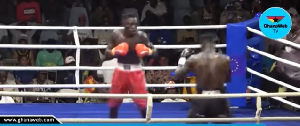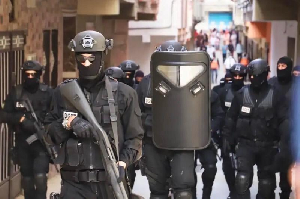- Home - News
- TWI News | TV
- Polls
- Year In Review
- News Archive
- Crime & Punishment
- Politics
- Regional
- Editorial
- Health
- Ghanaians Abroad
- Tabloid
- Africa
- Religion
- Election 2020
- Coronavirus
- News Videos | TV
- Photo Archives
- News Headlines
- Press Release
General News of Thursday, 28 December 2000
Source: allafrica.com -ofeibea quist-arcton
Rawlings Speaks Out On Continuing Violence Against Women
 As Ghanaians prepare for Thursday's second round of voting to usher in a new administration, outgoing President Jerry Rawlings addressed the nation on national radio and television. Appealing for a transition that would win the acclaim of the international community, Rawlings called for "a clean, honest and orderly demonstration of the will of the people."
As Ghanaians prepare for Thursday's second round of voting to usher in a new administration, outgoing President Jerry Rawlings addressed the nation on national radio and television. Appealing for a transition that would win the acclaim of the international community, Rawlings called for "a clean, honest and orderly demonstration of the will of the people."
In response to accusations of political opponents that the government had deployed troops in the second largest city, Kumasi, as well as other places, to intimidate voters, Rawlings said the increased security measures were there to ensure an election process that was "clean and transparent." "None of us," the president said, "must encourage our supporters to embark on any action that could lead to a situation beyond anyone's control," adding, "I trust in your very good sense."
Much of the Ghanaian leader's address focused on the killings of at least 30 women in the capital city since 1997, in what have been dubbed the "serial killings." Although Rawlings suggested the string of murders might have started in the Ashanti region rather than in Accra, he revealed that yet another body had been found in the Adenta area of the city on Wednesday. Rawlings said he had agonized over the situation for a very long time. "My heart has been full of grief and sympathy for the families of the Ghanaian sisters and daughters who have been murdered in very cold blood," he said. Most of the dead, he said, had been strangled and raped, their bodies usually partially naked, with clothing and condoms found nearby.
Another corpse was discovered last week, prompting women's groups to take to the streets of Accra in protest at the lack of police progress in finding the killers. See related story Activists have accused the police of not doing enough to solve the murders and have accused the government, including Rawlings, of failing Ghana's women by not devoting enough time or attention to the matter.
In his address, Rawlings urged "our mothers, sisters and daughters" to take care and avoid going out alone at night, when it is thought most of the killings have occurred. He announced that an educational campaign on the do's and don'ts to protect Ghana's women has been launched with the cooperation of women's groups and religious bodies. He also said an inter-agency task force has been formed, open to all political parties that "genuinely wanted to contribute" to solving the crimes.
At the same time, Rawlings expressed concern about what he called the politicization of the murders. He criticized statements to the media by opposition politicians, suggesting that "police have been unable to solve the murders because, as they put it, some powerful people are involved." The president implied that the timing of the two latest killings was significant, with one occurring on December 11, after the election commission announced a presidential run-off. The second, Rawlings noted, came less than 48 hours after the "great and sweet" soccer victory of Accra's Hearts of Oak in the African Club championships. Perhaps, he said, the murder had been planned "to abort, nullify and cancel the victory celebrations and depress the festive mood of the country."
The president said the recent killings had been followed by a new attempt by opponents to link government personalities to the string of murders. His voice quivering with emotion and outrage, Rawlings criticized a leading opposition politician for "proclaiming triumphantly" that the killings would stop as soon as a new government came into power. This, he said, suggested that some politicians were either playing a cruel joke at the expense of the victims and their families or that they knew something about the killings. The lives of Ghana's women "are too precious," he said, to be used in a political power game designed to make the government unpopular.
With the discovery of the latest victim, Ghana's voters may well be mulling over their president's stated determination to find the killers and stop the murders, although some have quipped that the election-eve expression of concern was belated. Nevertheless, there is widespread hope that a new administration will speed up police investigations into a series of crimes against women that many are calling a national crisis.










